L6 Culture Shock
culture shock阅读理解
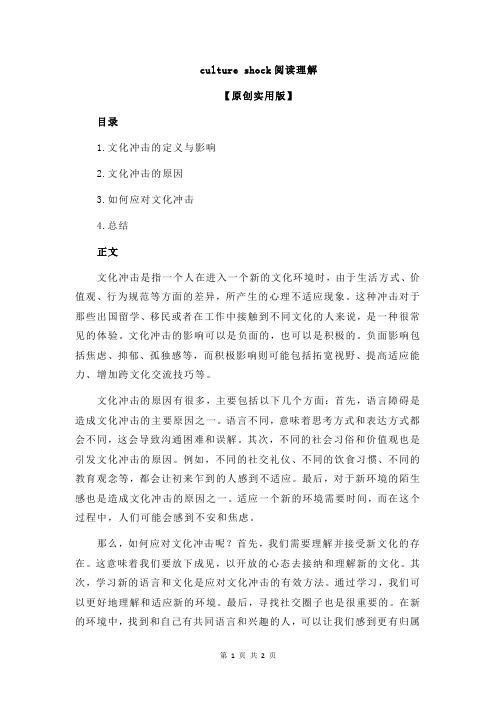
culture shock阅读理解
【原创实用版】
目录
1.文化冲击的定义与影响
2.文化冲击的原因
3.如何应对文化冲击
4.总结
正文
文化冲击是指一个人在进入一个新的文化环境时,由于生活方式、价值观、行为规范等方面的差异,所产生的心理不适应现象。
这种冲击对于那些出国留学、移民或者在工作中接触到不同文化的人来说,是一种很常见的体验。
文化冲击的影响可以是负面的,也可以是积极的。
负面影响包括焦虑、抑郁、孤独感等,而积极影响则可能包括拓宽视野、提高适应能力、增加跨文化交流技巧等。
文化冲击的原因有很多,主要包括以下几个方面:首先,语言障碍是造成文化冲击的主要原因之一。
语言不同,意味着思考方式和表达方式都会不同,这会导致沟通困难和误解。
其次,不同的社会习俗和价值观也是引发文化冲击的原因。
例如,不同的社交礼仪、不同的饮食习惯、不同的教育观念等,都会让初来乍到的人感到不适应。
最后,对于新环境的陌生感也是造成文化冲击的原因之一。
适应一个新的环境需要时间,而在这个过程中,人们可能会感到不安和焦虑。
那么,如何应对文化冲击呢?首先,我们需要理解并接受新文化的存在。
这意味着我们要放下成见,以开放的心态去接纳和理解新的文化。
其次,学习新的语言和文化是应对文化冲击的有效方法。
通过学习,我们可以更好地理解和适应新的环境。
最后,寻找社交圈子也是很重要的。
在新的环境中,找到和自己有共同语言和兴趣的人,可以让我们感到更有归属
感和安全感。
英语Culture_shock课件ppt课件

• 点评:这图是说我们中国人喜欢尝试新事 物吗,老外则与新事物保持一定的距离? 如果是这样的话,我想,还是那四个字: 不敢苟同。其实,中国人在对待新事物上 面,还是(我认为)非常保守的。
11、胃痛时的饮品
• 点评:我们中国人最讲究的不一定是科学, 而是老祖宗传下来的话。那就是胃痛时要 至少喝点热的。至于为什么?那得问我们 的中医去。他们的学问,那真是“话到嘴 边留半句”,深奥着呢。
12、旅游时
• 评:其实,这有些冤枉我们中国人。毕竟 我们中国人才富裕起来几年啊,终于可以 像小日本儿那样了,走到哪里都拍照了。 另外,中国人喜欢的不是思考生命的意义, 而是“到此一游”的意义。毕竟,有照片 可以说明俺老兄到过什么什么地方了。尤 其是去了国外,则更是要用照片说明。
1、表达个人观点时
• 点评:中国人在表达个人观点时,总喜欢拐弯抹 角。“是”时不说“是”,却说“不是”。“不 是”时不说“不是”,却总说“是”。生活中发 生的实际状况。并且,最有趣的是,一个中国人 如果像那老外那样直来直去地说出自己的观点的 话(如上图所示),则会被认为“没有城府”, 属于“直肠子”,是要吃亏的。事实上,中国人 的处事哲学中最重要的一点就是“话到嘴边留半 句”。因此,在老外眼中来看,中国人表达意思 时,总令他们费解。
9、聚会
• 点评:老外永远不会明白为什么中国人那 么喜欢过春节了,也永远闹不明白为什么 中国话里的“团圆”代表着多么深厚的文 化意涵。说他们没文化,我举双手赞成。 而他们却永远是在我们过团团圆圆的节日 聚会时,一个人跑到什么地方去感受一下 什么“生命的意义”去了。看看那巨大的 “圆”,这不正是一个最好的中国文化 “图腾”吗?我们中国人要什么?不就是 要个团圆么!
18、洗澡时间
• 点评:一看这老外就不太懂中国人的生活 习惯。要知道,晚上洗澡之后再睡觉,那 是一件多么愉悦的事情。而你老外白天当 不当正不正地洗哪门子澡呢。不懂生活。 另外,咱们中国人还有大多数的农民,他 们的洗澡时间,我想,绝对不是你老外能 弄明白的,小样。
culture shock阅读理解
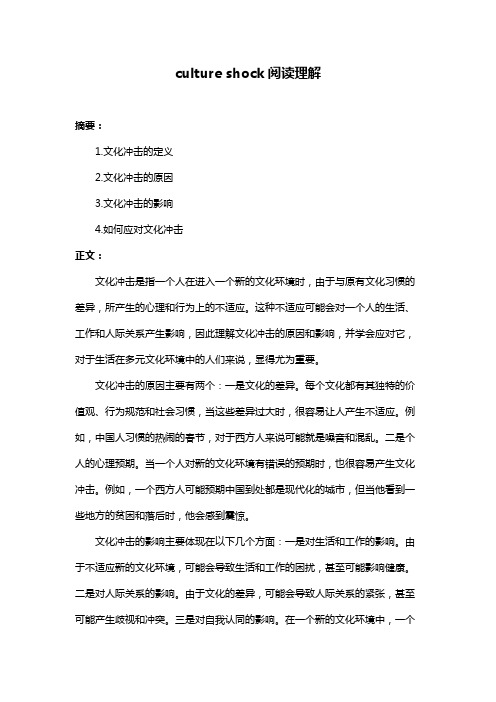
culture shock阅读理解摘要:1.文化冲击的定义2.文化冲击的原因3.文化冲击的影响4.如何应对文化冲击正文:文化冲击是指一个人在进入一个新的文化环境时,由于与原有文化习惯的差异,所产生的心理和行为上的不适应。
这种不适应可能会对一个人的生活、工作和人际关系产生影响,因此理解文化冲击的原因和影响,并学会应对它,对于生活在多元文化环境中的人们来说,显得尤为重要。
文化冲击的原因主要有两个:一是文化的差异。
每个文化都有其独特的价值观、行为规范和社会习惯,当这些差异过大时,很容易让人产生不适应。
例如,中国人习惯的热闹的春节,对于西方人来说可能就是噪音和混乱。
二是个人的心理预期。
当一个人对新的文化环境有错误的预期时,也很容易产生文化冲击。
例如,一个西方人可能预期中国到处都是现代化的城市,但当他看到一些地方的贫困和落后时,他会感到震惊。
文化冲击的影响主要体现在以下几个方面:一是对生活和工作的影响。
由于不适应新的文化环境,可能会导致生活和工作的困扰,甚至可能影响健康。
二是对人际关系的影响。
由于文化的差异,可能会导致人际关系的紧张,甚至可能产生歧视和冲突。
三是对自我认同的影响。
在一个新的文化环境中,一个人可能会对自己的文化身份产生质疑,这可能会对他的自我认同产生影响。
那么,如何应对文化冲击呢?首先,我们需要理解并接受文化差异。
每个文化都有其存在的理由,我们应尊重并理解它们。
其次,我们需要调整我们的心理预期。
我们应以开放的心态去接受新的文化环境,而不是抱有过高的期待。
最后,我们需要积极地融入新的文化环境。
只有通过积极的互动和交流,我们才能更好地适应新的文化环境。
CultureShock(翻译)
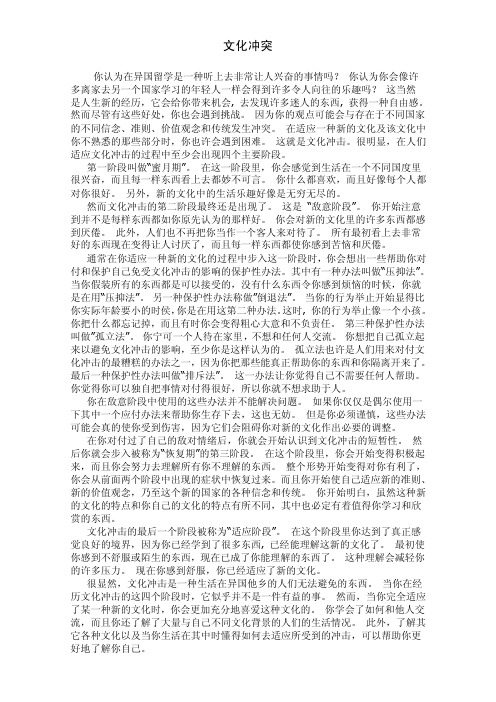
文化冲突你认为在异国留学是一种听上去非常让人兴奋的事情吗?你认为你会像许多离家去另一个国家学习的年轻人一样会得到许多令人向往的乐趣吗?这当然是人生新的经历,它会给你带来机会, 去发现许多迷人的东西, 获得一种自由感。
然而尽管有这些好处,你也会遇到挑战。
因为你的观点可能会与存在于不同国家的不同信念、准则、价值观念和传统发生冲突。
在适应一种新的文化及该文化中你不熟悉的那些部分时,你也许会遇到困难。
这就是文化冲击。
很明显,在人们适应文化冲击的过程中至少会出现四个主要阶段。
第一阶段叫做“蜜月期”。
在这一阶段里,你会感觉到生活在一个不同国度里很兴奋,而且每一样东西看上去都妙不可言。
你什么都喜欢,而且好像每个人都对你很好。
另外,新的文化中的生活乐趣好像是无穷无尽的。
然而文化冲击的第二阶段最终还是出现了。
这是“敌意阶段”。
你开始注意到并不是每样东西都如你原先认为的那样好。
你会对新的文化里的许多东西都感到厌倦。
此外,人们也不再把你当作一个客人来对待了。
所有最初看上去非常好的东西现在变得让人讨厌了,而且每一样东西都使你感到苦恼和厌倦。
通常在你适应一种新的文化的过程中步入这一阶段时,你会想出一些帮助你对付和保护自己免受文化冲击的影响的保护性办法。
其中有一种办法叫做“压抑法”。
当你假装所有的东西都是可以接受的,没有什么东西令你感到烦恼的时候,你就是在用“压抑法”。
另一种保护性办法称做”倒退法”。
当你的行为举止开始显得比你实际年龄要小的时侯,你是在用这第二种办法。
这时, 你的行为举止像一个小孩。
你把什么都忘记掉,而且有时你会变得粗心大意和不负责任。
第三种保护性办法叫做”孤立法”。
你宁可一个人待在家里,不想和任何人交流。
你想把自己孤立起来以避免文化冲击的影响,至少你是这样认为的。
孤立法也许是人们用来对付文化冲击的最糟糕的办法之一,因为你把那些能真正帮助你的东西和你隔离开来了。
最后一种保护性办法叫做“排斥法”。
这一办法让你觉得自己不需要任何人帮助。
综合英语二课文概括 (1-8课)
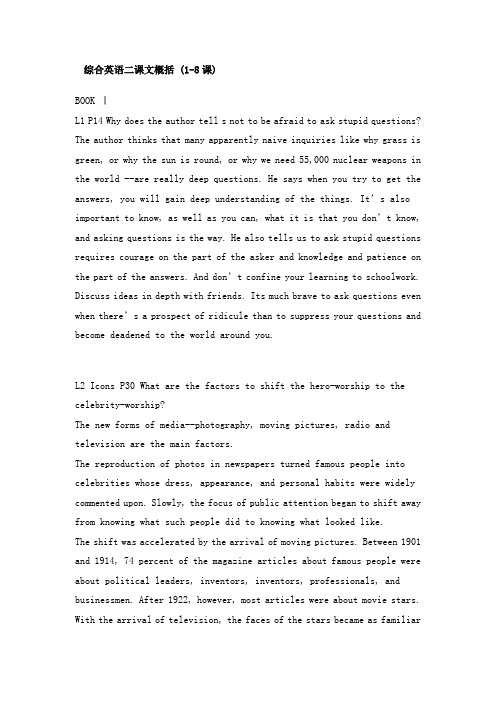
综合英语二课文概括 (1-8课)BOOK ⅠL1 P14 Why does the author tell s not to be afraid to ask stupid questions? The author thinks that many apparently naive inquiries like why grass is green, or why the sun is round, or why we need 55,000 nuclear weapons in the world --are really deep questions. He says when you try to get the answers, you will gain deep understanding of the things. It’s also important to know, as well as you can, what it is that you don’t know, and asking questions is the way. He also tells us to ask stupid questions requires courage on the part of the asker and knowledge and patience on the part of the answers. And don’t confine your learning to schoolwork. Discuss ideas in depth with friends. Its much brave to ask questions even when there’s a prospect of ridicule than to suppress your questions and become deadened to the world around you.L2 Icons P30 What are the factors to shift the hero-worship to the celebrity-worship?The new forms of media--photography, moving pictures, radio and television are the main factors.The reproduction of photos in newspapers turned famous people into celebrities whose dress, appearance, and personal habits were widely commented upon. Slowly, the focus of public attention began to shift away from knowing what such people did to knowing what looked like.The shift was accelerated by the arrival of moving pictures. Between 1901 and 1914, 74 percent of the magazine articles about famous people were about political leaders, inventors, inventors, professionals, and businessmen. After 1922, however, most articles were about movie stars. With the arrival of television, the faces of the stars became as familiaras those we saw across the breakfast table. We came to know more about the lives of the celebrities than we did about most of the people we know personally. Less than seventy years after the appearance of the first moving pictures, the shift from hero-worship to celebrity-worship was complete.L2 GO-GO AMERICAN P46 What is the Americans attitude towards time? Give necessary examples.In the United States, many people keenly feel the shortness of each lifetime. They are aware that once a day in their life is gone, it will never come back. And Americans believe no one stands still. If you are not moving ahead, you are falling behind. So, they value time and want every minute to count.This attitude towards time is shown in the fast pace of life in the country. Whatever they do they always seem to be in a rush. You find people hurrying to get where they are going. They hurry to eating places for a meal and finish it as quickly as possible.Also Americans do what they can to save time. They produce a lot of labour-saving devices such as clothes-and dish-washers; they rapidly communicate through phone calls, telex and e-mail and cut down on personal contacts.L4 Take Over, Bosn! P62 Can you imagine what did Barret think of when he heard Snyder’s whisper Take over, bosn?Because of thirst, Barret was almost out of mind. He rose several times and was a consta nt threat. But when he heard Snyder said “Take over, bosn, he had a strange feeling suddenly. He came to realize he would and must take over the task and be responsible for the rest. As long as he stoppedothers from the little water, they would always hav e hopes and wouldn’t die soon. So, he picked Snyder’s gun up and decided to hold off the other from the water until night when a ship saved them.L5 Are You Giving Your Kids Too Much?P78 Why parents overindulge their children?There are several reasons to explain why parents overindulge their children. One fairly common reason is that parents overindulge their children out of a sense of guilt. Parents who both hold down full-time jobs may feel guilty about the amount of time they spend away from their children and may attempt to compensate by showering them with material possessions. Other parents overindulge because they want their children to have everything they had while growing up, along with those things the parents yearned for but didn’t get. Still others are afraid to say no to their children’s dintless requests for toys for fear that their children will feel unloved or will be ridiculed if thy don’t have the same playthings their friends have.L6 Culture Shock P94 What are four stages that people go through when they experience situations that are very different from those to which they are accustomed?Stage one is a honeymoon phase, during which the new experience is perceived to be interesting, picturesque, entertaining, and charming. You may notice several superficial differences such as music, food, and clothing, and the fresh apeal of the new experience keeps you feeling interested and positive. When you stay in a new envirnment for a while, you move to stage two-the crisis stage-in which the shine wears off and day-to-day realities sink in. In relationship, you notie annoyinghabits;in a new country, you find barriers to establishing connections or to learning the language beyond a few polite phrases. If you stick with the experience and try to deal with it realistically, you will probably move to the third phase:recovery. In recovery, you learn the systems, procedures, language or nonverbal behaviors of the new environment so that you can cope with it on the basis of some mastery, competence, and comfort. Finally,when you feel that you function well and almost automatically in the new culture, you will move to the fourth phase:adjustment.L7 The Model Millionaire(I) P108 Suppose you are the millionaire.Explain how you get to know Hughie Erskine and what you do in return for the pound he gave you when you first met.I am Baron Hausberg. I have enough money to buy the whole of London. One day, on a whim I asked my artist friend Alan Trevor to pain me as a beggar. Alan had almost finished the picture when a very charming young man walked into his studio.I suppose he must have been very sympathetic with me, for when Alan was away a minute, the young man quickly put a pound into my hat. I was startled for a moment, but I was pleased when I realized that he took me for a real begger.Later I learned from Alan all about this young man:he was poor, and could not marry the girl he loved because her father wouldnt let them unless he had 10,000 pounds.Touched by the young mans spirit of kindness, I decided to help him. The next day I had a cheque for 10,000 pounds delivered to him as a wedding gift.L8 The Model Millionaire(II) P123 Retell the story The Model Millionaire in about 150 words, concluding your retelling with a one-sentence comment. Hughie Erskine was a charming young man who was in love with a nice girlcalled Laura uras father made it clear to Hughie that he would not marry his daughter to him until Hughie had ten thousand pounds. One day,Hughie went to see his artist friend Alan Trevor in his studio. There he found his friend painting a beggar, who was an old man in rags.Hughie felt so sorry for the poor model that he gave him the only pound he had.The old model was actually a millionaire.When he heard all about Hughie and Laura, and their problem, he had a cheque for ten thousand pounds delivered to him the very next day.The couple were happily married,and the beggar attended their wedding.The story shows that a genuine millionaire is not one who has, but who give.。
Unit 6-Cultural Shock 文化冲击
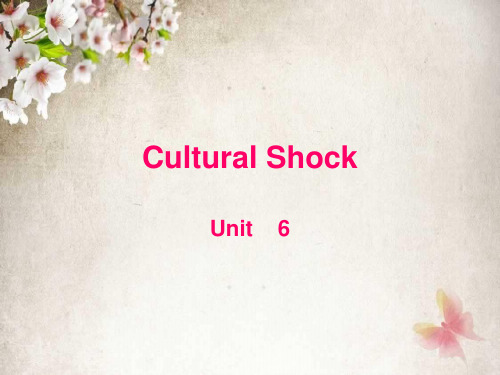
Cultural Difference
Cultural Difference
Cultural Difference
Cultural Difference
Cultural Shock
The "Honeymoon Phase"
During this period the differences between the old and new culture are seen in a romantic light, wonderful and new. For example, in moving to a new country, an individual might love the new foods, the pace of the life, the people's habits, the buildings and so on.
父母的支持
驾照
路考
签发
着迷的
Global Understanding
Culture Shock 文化冲击
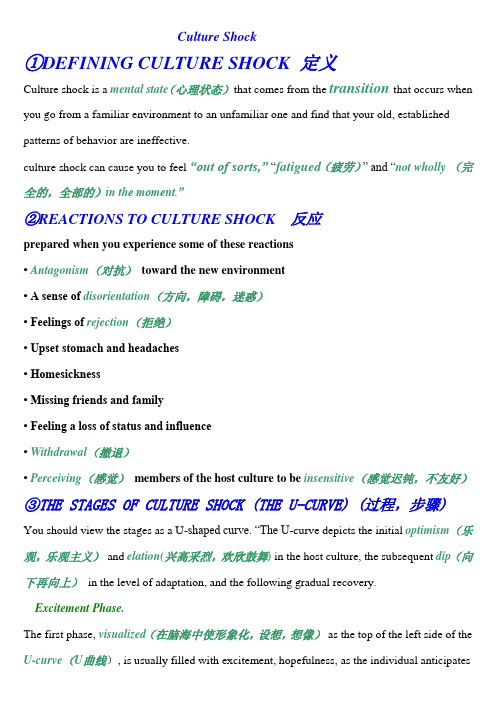
Culture Shock①DEFINING CULTURE SHOCK 定义Culture shock is a mental state(心理状态)that comes from the transition that occurs when you go from a familiar environment to an unfamiliar one and find that your old, established patterns of behavior are ineffective.culture shock can cause you to feel “out of sorts,”“fatigued(疲劳)” and “not wholly (完全的,全部的)in the moment.”②REACTIONS TO CULTURE SHOCK 反应prepared when you experience some of these reactions• Antagonism(对抗)toward the new environment• A sense of disorientation(方向,障碍,迷惑)• Feelings of rejection(拒绝)• Upset stomach and headaches• Homesickness• Missing friends and family• Feeling a loss of status and influence• Withdrawal(撤退)• Perceiving(感觉)members of the host culture to be insensitive(感觉迟钝,不友好)③THE STAGES OF CULTURE SHOCK (THE U-CURVE) (过程,步骤) You should view the stages as a U-shaped curve. “The U-curve depicts the initial optimism(乐观,乐观主义)and elation(兴高采烈,欢欣鼓舞) in the host culture, the subsequent dip(向下再向上)in the level of adaptation, and the following gradual recovery.Excitement Phase.The first phase, visualized(在脑海中使形象化,设想,想像)as the top of the left side of the U-curve(U曲线), is usually filled with excitement, hopefulness, as the individual anticipatesbeing exposed to a new culture.Disenchantment(觉醒,清醒)Phase.This second phase begins when you recognize the reality of the new setting and some initial problems begin to develop.The second phase is a period when difficulties of language, inadequate schools for the children, poor housing, crowded transportation, chaotic shopping, and the like begintaking their toll.Beginning Resolution Phase.The third phase is characterized by gaining some understanding of the new culture. Here the person is gradually making some adjustments and modifications in how he or she is coping with the new culture. Events and people now seem much more predictable and less stressful. Effective Functioning Phase.In this final phase, at the top of the right side of the U-curve, the person now understands the key elements of the new culture (values, special customs, beliefs, communication patterns, etc.). One’s ability to live and function within two cultures (the old and the new) is frequently accompanied(陪伴)by feelings of elation and satisfaction.When this happens, the returnee experiences the same four phases of adjustment we discussed in the U-curve. This gives rise to the term “W-curve,” because it joins two U-curves together.④THE LESSONS OF CULTURE SHOCKOur discussion of culture shock was predicated on two premises.F irst, each year millions of people go abroad to work, travel, and study.Second, many of those experiences end up producing stress, homesickness, and confusion.A lthough we have placed the topic of culture shock under the category of “problems,” we would be remiss if we concluded our discussion without emphasizing the idea that culture shock can be an explicit learning experience.E xperiencing culture shock has a strong potential to make people bemulticulturalBeyond Culture ShockN ewcomers may not be ready to learn and practice social behaviors appropriate to the new culture in the initial period of settlement. It is not unusual for recent arrivals 。
Culture Shock中英对译及缩写
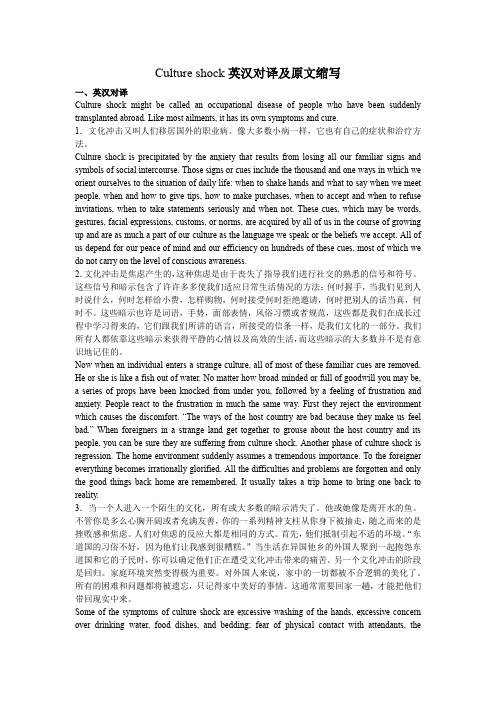
Culture shock英汉对译及原文缩写一、英汉对译Culture shock might be called an occupational disease of people who have been suddenly transplanted abroad. Like most ailments, it has its own symptoms and cure.1.文化冲击又叫人们移居国外的职业病。
像大多数小病一样,它也有自己的症状和治疗方法。
Culture shock is precipitated by the anxiety that results from losing all our familiar signs and symbols of social intercourse. Those signs or cues include the thousand and one ways in which we orient ourselves to the situation of daily life: when to shake hands and what to say when we meet people, when and how to give tips, how to make purchases, when to accept and when to refuse invitations, when to take statements seriously and when not. These cues, which may be words, gestures, facial expressions, customs, or norms, are acquired by all of us in the course of growing up and are as much a part of our culture as the language we speak or the beliefs we accept. All of us depend for our peace of mind and our efficiency on hundreds of these cues, most of which we do not carry on the level of conscious awareness.2.文化冲击是焦虑产生的,这种焦虑是由于丧失了指导我们进行社交的熟悉的信号和符号。
culture_shock
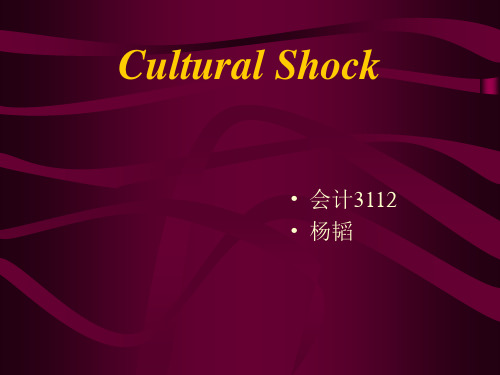
• Maintain contact with the new culture. Learn the language. Volunteer in community activities that allow you to practice the language that you are learning. This will help you feel less stress about language and useful at the same time.保持接触新的文化。 学习语言。志愿者在社区 活动,让你练习语言,你正在学习。这将帮助你感觉更少 的压力对语言和有用的同时。 • Allow yourself to feel sad about the things that you have left behind: your family, your friends, etc. 允许你自己感到悲伤的事,你所留下的:你的家人,你的 朋友等等。 • Recognize the sorrow of leaving your old country. Accept the new country. Focus your power on getting through the transition. • Pay attention to relationships with your family and at work. They will serve as support for you in difficult times. 认识到你的旧国家感到伤心的离开。 接受这个新国家。把你的权力得到通过过渡。注意与 家人的关系和工作。他们将作为支持你在困难时期。
它发生在那些已经被突然出国了
• 文化冲击发生由于完全沉浸在一个陌生的文化。
Culture shock 文化冲击

Conclusion
Culture shock is not fearful, what is fearful is we lack of the courage to overcome it.
If you stay calm, observe and learn, and keep things in perspective, you'll probably find that your difficulties will pass.
Thanks you!
Table manner
One topic is chopsticks. Because of using chopsticks, instead of using spoon, when Chinese people having rice or soup, it’s likely for us to hold up our bowls. But this habit is considered rude in the Western countries.
Culture Shock
PPT By Qin Jing
Speech By Zhao Shuo
Firstly, I want to share with you a short story:
There was a Chinese man in America for the first time to earn money, and after he had learned little English, he went to rent house alone. There he said in Chinglish: “I eat you ,sleep you, how much a week?”(我吃你的,住你,多少钱一个 月) Surely ,the house lady was shocked by his word and felt embarrassed.
culture shock中英文对照
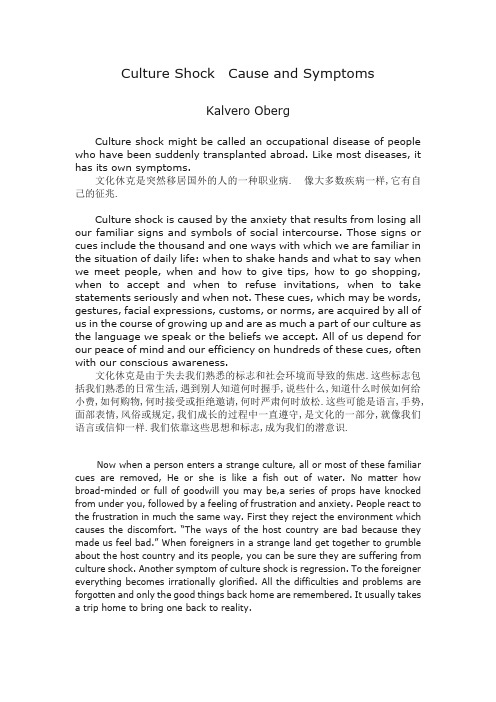
Culture Shock Cause and SymptomsKalvero ObergCulture shock might be called an occupational disease of people who have been suddenly transplanted abroad. Like most diseases, it has its own symptoms.文化休克是突然移居国外的人的一种职业病. 像大多数疾病一样,它有自己的征兆.Culture shock is caused by the anxiety that results from losing all our familiar signs and symbols of social intercourse. Those signs or cues include the thousand and one ways with which we are familiar in the situation of daily life: when to shake hands and what to say when we meet people, when and how to give tips, how to go shopping, when to accept and when to refuse invitations, when to take statements seriously and when not. These cues, which may be words, gestures, facial expressions, customs, or norms, are acquired by all of us in the course of growing up and are as much a part of our culture as the language we speak or the beliefs we accept. All of us depend for our peace of mind and our efficiency on hundreds of these cues, often with our conscious awareness.文化休克是由于失去我们熟悉的标志和社会环境而导致的焦虑.这些标志包括我们熟悉的日常生活,遇到别人知道何时握手,说些什么,知道什么时候如何给小费,如何购物,何时接受或拒绝邀请,何时严肃何时放松.这些可能是语言,手势,面部表情,风俗或规定,我们成长的过程中一直遵守,是文化的一部分,就像我们语言或信仰一样.我们依靠这些思想和标志,成为我们的潜意识.Now when a person enters a strange culture, all or most of these familiar cues are removed, He or she is like a fish out of water. No matter how broad-minded or full of goodwill you may be,a series of props have knocked from under you, followed by a feeling of frustration and anxiety. People react to the frustration in much the same way. First they reject the environment which causes the discomfort. “The ways of the host country are bad because they made us feel bad.” When foreigners in a strange land get together to grumble about the host country and its people, you can be sure they are suffering from culture shock. Another symptom of culture shock is regression. To the foreigner everything becomes irrationally glorified. All the difficulties and problems are forgotten and only the good things back home are remembered. It usually takes a trip home to bring one back to reality.当一个人进入一个陌生的环境,所以这些熟悉的线索都消失了.他就像一条离开了水的鱼, 不管你有多么的思想开放多么的友好善良,一系列的问题会来到你的身边,带给你沮丧和焦虑.人们对挫折的反应大致相同,首先是拒绝带给他不适的环境, “这个国家很坏因为它让我感觉很坏”.当一个陌生地方的人一起抱怨这个国家和这个国家的人, 你就可以肯定他们正在遭受文化冲击.文化休克的另一个症状就是逃避.对于一个外国人来说每一样事物都变的无法忍受.所有的困难和问题都忘记了,只剩下回家这一个念头. 通常只有一趟回家之旅才会把他带回现实.Some of the symptoms of culture shock are: excessive washing of the hands; excessive concern over drinking water, food dishes, and bedding; fear of physical contact with attendants; the absent-minded stare; a feeling of helplessness and a desire for dependence on long-term residents of one's own nationality; fits of anger over minor frustrations; great concern over minor pains and eruptions of the skin; and finally, that terrible longing to be back home.文化休克的另一些症状是:过度的洗手,过度关注饮用水,食物,床上用品,恐惧与服务员身体接触,失神凝望,感觉很无助,渴望依赖在这里长期居住的同国籍的人, 小事就能引起愤怒,对轻微的疼痛和皮疹过度关注, 最终极度渴望重返家园.Individual differ greatly in the degree in which culture shock affects them. Although not common, there are individual who cannot live in foreign countries. However, those who have seen people go through culture shock and on to a satisfactory adjustment can see steps in the process.文化冲击对不同的人有不同程度的影响.尽管并不普遍, 有些人不能在国外生活.然而,可以看看有些已经克服文化冲击并且有一个满意的调整,可以参照一下步骤.Stages of AdjustmentRaymond ZeuschnerKalvero Oberg describes four stages that people go through when they experience situations that are very different from those to which they are accustomed. Examples of such situations include moving to a new city, traveling to anew country, and becoming part of a new organization, military unit or corporation.Kalvero Oberg介绍了适应与他们熟悉的环境有很大不同的情况有四个阶段.包括移居到一个新的城市,前往一个新的国家,成为一个组织,军队或公司的一员.Stage one is a honeymoon phase, during which the new experience is perceived to be interesting, picturesque, entertaining, and charming. You may notice several superficial differences such as music, food and clothing, and the fresh appeal of the new experience keeps you feeling interested and positive. If you are a real tourist, you probably do not stay long enough for this phase to wear off but go on to the next new location or experience. There are people who frequently change jobs, majors, romantic partners, travel plans, clothing styles, foods, diets, or cars so that they never get very far away from the honeymoon stage of culture shock. It is very pleasant to travel and to try out and explore whatever is new.第一阶段是一个蜜月期.在此期间新的体验被认为是有趣的,美丽的,好玩的,迷人的.你可能会注意到一些肤浅的差异,比如音乐,食物,衣服,新经验让你感觉新鲜有趣.如果你是一个真正的旅游者,在这个阶段不会停留很久,因为会去新的地方,有新的经历.有些人经常更换工作, 专业的浪漫的合作者,旅行计划,服装风格,食品,饮食,或汽车,因此,他们离文化冲击很远.蜜月阶段是非常愉快的旅行,并尝试和探索一切新的东西.When you stay in a new environment for a while, you move to stage two——the crisis stage——in which the shine wears off and the day-to-day realities sink in. In a relationship, you notice annoying habbits; in a new country, you find barriers to establishing connections or to learning the language beyond a few polite phrases. Suddenly, your new major includes a class or a professor you dislike. The difficulties and unpleasantness of realities replace the charming and picturesque “honeymoon.' However,if you stick with the experience and try to deal with it realistically, you will probably move to the third phase of culture shock: recovery.当你在一个新环境待一段时间,你就进入了第二阶段——危机阶段——在这个阶段所以的光环消退,现实的环境摆在你面前.在人际关系方面,你发现了令人烦恼的障碍,在一个新的国家,你发现建立人际关系学习新的语言是有障碍的,比起第一个阶段来.突然之间,你的新专业涉及到的课程和教授你都不喜欢.困难和不愉快的现实取代了第一阶段迷人的蜜月期.然而,如果你能够坚持下去并且尝试去处理,你可能会进去文化冲击的第三阶段:恢复.In recovery, you learn the systems, procedures, language, or nonverbal behaviors of the new environment so that you can cope with it on the basis of some mastery, competence, and comfort. After about two weeks in London, I began to feel familiar with traveling by 'tube,“ shopping nearly every day for groceries, paying in the correct currency, buying a newspaper, and using some phrases that are unique to English people. I had the advantage of speaking the same basic language and of sharing a great deal with the English in some broad, cultural aspects. In a country that was very different from my own, It would probably have taken me longer to move into the recovery phase.在恢复阶段,你学习新环境里的制度,程序,语言,行为以便能够熟练驾驭.在伦敦大概两周之后,我开始熟悉乘坐地铁旅行,几乎每天去杂货店物,用正确的货币支付,买报纸,使用一些当地人才用的英语.文化方面我有说同种语言的优势.在一个与我自己的国家有很大不同的地方,可能让我用更长的时间去进入恢复阶段.Finally,the fourth, or adjustment, phase occurs when you feel that you function well and almost automatically in the new culture. You no longer need to make mental conversions of the country's money; you know where services are located and how to use them; you understand some of the customs that accompany ordinary life, and it is relatively easy for you to adjust to them. A greater enjoyment of the new experience is now possible, and you may regain some of the initial positive regard you had in the honeymoon stage. If you stay long enough on a visit from a big city to a small town, or, the other way round, you may become so well adapted to the new environment that when you return to your original home, you will again experience culture shock. For some people, it may take several days to readjust. depending on the length of time they were away. Usually, however, since you are in your home culture, your shock wears off faster than the shock that you experienced in the new culture.最后是第四个阶段,也就是调整阶段.这时你感觉已经在一个新文化中适应良好. 你不再需要在心里转换该国货币,你知道各项服务的位置以及如何使用它们,你了解如何适应生活习俗,那对你来说很简单.新的经历可能让你轻松愉快,你也许会重新感受到最初的蜜月阶段的甜蜜.如果你保持足够长的从大城市到小城镇的访问,或者反过来,你可能变得很好地适应新的环境.当你返回最初的家园,你可能还要体验一次文化冲击.对一些人来说,可能要花费几天去重新适应,根据他们离开的时间的长短有所不同.通常,比起你所经历的新的文化,在你自己的本土文化里,冲击要消退的更快一些.。
cultural shock英语作文
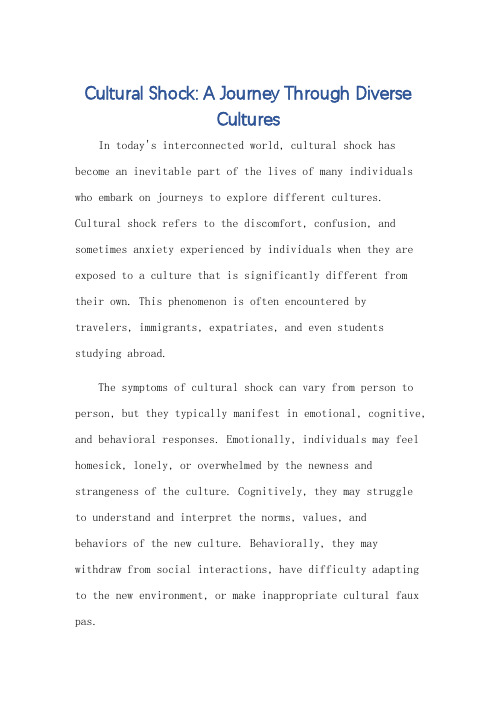
Cultural Shock: A Journey Through DiverseCulturesIn today's interconnected world, cultural shock has become an inevitable part of the lives of many individuals who embark on journeys to explore different cultures. Cultural shock refers to the discomfort, confusion, and sometimes anxiety experienced by individuals when they are exposed to a culture that is significantly different from their own. This phenomenon is often encountered by travelers, immigrants, expatriates, and even students studying abroad.The symptoms of cultural shock can vary from person to person, but they typically manifest in emotional, cognitive, and behavioral responses. Emotionally, individuals may feel homesick, lonely, or overwhelmed by the newness and strangeness of the culture. Cognitively, they may struggleto understand and interpret the norms, values, andbehaviors of the new culture. Behaviorally, they may withdraw from social interactions, have difficulty adapting to the new environment, or make inappropriate cultural faux pas.The stages of cultural shock also vary among individuals, but they generally follow a pattern of adjustment. The initial stage is often characterized by excitement and curiosity about the new culture. However, as time passes and the initial euphoria fades, individuals may enter a period of disillusionment and disappointment as they encounter the challenges and difficulties of cultural adaptation. This stage can be particularly difficult as individuals may feel a sense of loss and displacement.The next stage is often marked by a period of adjustment and accommodation as individuals begin to understand and accept the new culture. They may start to develop new coping strategies and behaviors that help them navigate the new environment. During this stage,individuals may also begin to identify with the new culture and even embrace it as their own.Finally, the last stage of cultural shock is marked by a sense of mastery and comfort as individuals have fully adapted to the new culture. They may have developed a new identity that incorporates both their own cultural heritage and the new culture. At this stage, individuals may evenfeel a sense of belonging and connectedness to the new culture.Dealing with cultural shock requires patience, understanding, and an open mind. It is important to recognize that every culture has its own unique norms, values, and behaviors, and that it is okay to feel lost and confused at times. It is also essential to maintain a positive attitude and to seek out support from others who have experienced similar situations.In conclusion, cultural shock is a natural part of the process of cultural adaptation. By understanding the stages of cultural shock and developing strategies to cope with it, individuals can overcome the challenges and difficulties of cultural adaptation and embrace the rich and diverse experiences that lie ahead.**文化冲击:穿越多元文化的旅程**在当今互联互通的世界里,文化冲击已经成为许多踏上探索不同文化之旅的人不可避免的一部分。
大学英语六级阅读理解关于文化冲击
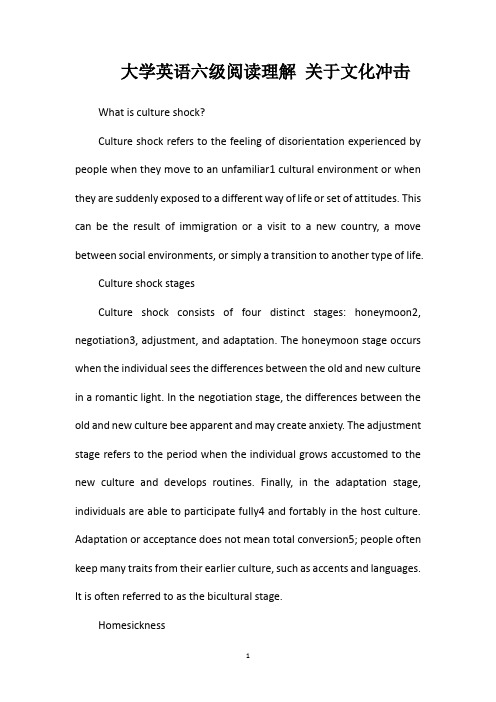
大学英语六级阅读理解关于文化冲击What is culture shock?Culture shock refers to the feeling of disorientation experienced by people when they move to an unfamiliar1 cultural environment or when they are suddenly exposed to a different way of life or set of attitudes. This can be the result of immigration or a visit to a new country, a move between social environments, or simply a transition to another type of life.Culture shock stagesCulture shock consists of four distinct stages: honeymoon2, negotiation3, adjustment, and adaptation. The honeymoon stage occurs when the individual sees the differences between the old and new culture in a romantic light. In the negotiation stage, the differences between the old and new culture bee apparent and may create anxiety. The adjustment stage refers to the period when the individual grows accustomed to the new culture and develops routines. Finally, in the adaptation stage, individuals are able to participate fully4 and fortably in the host culture. Adaptation or acceptance does not mean total conversion5; people often keep many traits from their earlier culture, such as accents and languages. It is often referred to as the bicultural stage.HomesicknessCulture shock may cause homesickness. This refers to the feeling of longing6 for one#39;s home. People suffering from culture shock typically experience a bination of depressive and anxious symptoms related to homesickness. Ways of coping with homesickness include developing a hobby, thinking positively7 and feeling grateful about what one has, and building new relationships.Cultural shock is a natural phenomenon that occurs when one has a cross-cultural experience. Going through the different stages can take weeks, months or years. But ultimately, the experience can be enriching and may end up with either adaptation with the new culture or a return home.根据上文判断对错Culture shock occurs only as a result of immigration.a. Trueb. FalseThe adaptation stage means that there is a plete change of personality.a. Trueb. FalseHomesickness and culture shock refer to the same thing.a. Trueb. FalseCulture shock has also positive effects on people experiencing it.a. Trueb. False.答案false false false true。
cultureshock
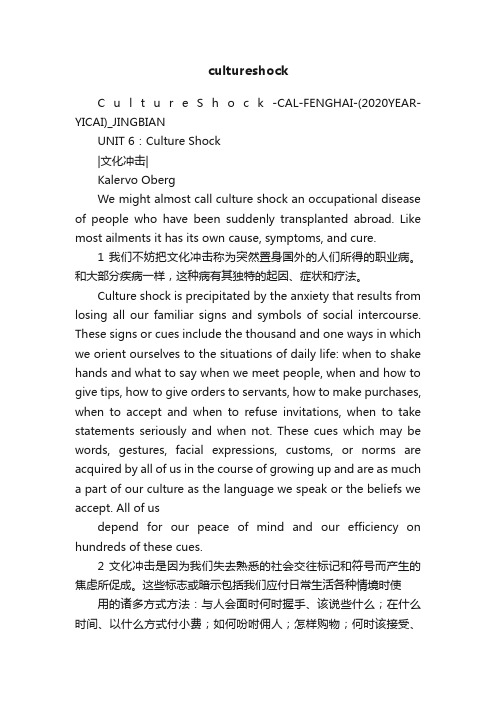
cultureshockC u l t u r e S h o c k -CAL-FENGHAI-(2020YEAR-YICAI)_JINGBIANUNIT 6:Culture Shock|文化冲击|Kalervo ObergWe might almost call culture shock an occupational disease of people who have been suddenly transplanted abroad. Like most ailments it has its own cause, symptoms, and cure.1 我们不妨把文化冲击称为突然置身国外的人们所得的职业病。
和大部分疾病一样,这种病有其独特的起因、症状和疗法。
Culture shock is precipitated by the anxiety that results from losing all our familiar signs and symbols of social intercourse. These signs or cues include the thousand and one ways in which we orient ourselves to the situations of daily life: when to shake hands and what to say when we meet people, when and how to give tips, how to give orders to servants, how to make purchases, when to accept and when to refuse invitations, when to take statements seriously and when not. These cues which may be words, gestures, facial expressions, customs, or norms are acquired by all of us in the course of growing up and are as much a part of our culture as the language we speak or the beliefs we accept. All of usdepend for our peace of mind and our efficiency on hundreds of these cues.2 文化冲击是因为我们失去熟悉的社会交往标记和符号而产生的焦虑所促成。
六级简答选词填空课下演练题答案

3.【参考答案】are emotional "roller coaster" andfatigue【答题技巧】从问题入手,深入下去是本题的捷径。
【详细解答】从第三段的第一句话入手:Fatigue is another problempeople face when entering a newculture“another”一词表明,前面第二段涉及的还有另一个问题。
4.【参考答案】the mental fatigue【答题技巧】由原因推向结果是解题的思题。
【详细解答】本题只要注意到了第三段的最后一句:The mental fatiguecomes from straining to comprehend the language,and copingwith new situations.答案便迎刃而解。
本句,The mental fatigue 是结果,coping with newsituation是原因之一,本题问题是coping with newsituation可能引起什么。
那么,我们只要由原因推向结果即可。
5.【参考答案】fitting some regular routines into thenew culture.【答题技巧】浏览一个段落,通过比较得出结论是本题的关键。
【详细解答】解决“文化休克”的最有效的办法是什么,文中最后一段提到,one solution…is to…,Another activity isto …,Even better is …,据作者的口气,三个方案中,最有效的建议便是:fitting things that werepart of the regular routine back in the home country into the routine established in the new culture,对于这么长的方案,我们只挑主要的说就可以了。
culture shock的英语作文

culture shock的英语作文Culture shock is a common phenomenon experienced by many people who travel or move to a new country. It refers to the feeling of disorientation or confusion that arises when individuals are exposed to a different culture, customs, and way of life that are unfamiliar to them.There are several stages of culture shock that people typically go through when they relocate to a new environment. The first stage is the initial euphoria or "honeymoon" phase, where individuals are excited and enthusiastic about exploring the new culture and everything it has to offer. This phase is often characterized by curiosity and a sense of adventure.However, as time goes on, individuals may begin to experience the second stage of culture shock known as the "frustration" phase. During this stage, people may feel overwhelmed by the challenges of adjusting to the new culture, such as language barriers, social norms, and different ways of doing things. They may feel isolated, frustrated, and homesick as they struggle to adapt to their new surroundings.The third stage of culture shock is the "adjustment" phase, where individuals gradually start to acclimate to the new cultureand feel more comfortable in their new environment. They begin to develop coping strategies, build new relationships, and navigate the challenges of living in a different culture. This stage is marked by a sense of acceptance and integration into the new society.Finally, the last stage of culture shock is the "adaptation" phase, where individuals fully embrace the new culture and feel at home in their new surroundings. They have learned to appreciate the differences and similarities between their home culture and the new culture, and have developed a sense of belonging in their new community.There are several ways to cope with culture shock and make the transition to a new culture smoother. One important strategy is to keep an open mind and be willing to learn about the new culture. This can involve immersing oneself in the local language, customs, and traditions, as well as seeking out opportunities to interact with locals and participate in community activities.Another helpful tip is to connect with other expats or individuals who have experienced culture shock themselves. They can provide valuable support, insights, and advice on how to navigate the challenges of living in a new country. Building a support network of friends, colleagues, and mentors can alsohelp individuals feel more connected and less isolated in their new environment.It's important to remember that culture shock is a normal and natural part of the expatriate experience, and that it takes time to adjust to a new culture. By being patient, flexible, and proactive in adapting to the challenges of living in a different country, individuals can overcome culture shock and thrive in their new environment. Ultimately, culture shock can be a transformative and enriching experience that broadens one's horizons and expands their understanding of the world.。
culture shock 作文

Adjust by YourselfYesterday, when I logged in my microblog, I encountered a friend who had just gone abroad updating a micro-blog. She said that she was lonely and wanted to go back to China as soon as possible. I still remember how exciting she is last year. Within a year, her attitude changed sharply. Now I realized that she had just passed the Honeymoon Stage and became inimical to the culture shock.We live in a culture-blending world. On campus, there is no doubt that we are all Chinese. But sometimes we also cannot understand each other clearly. People from different places have different values. For example, no one from the north can understand why people from south like me are so afraid of coldness. I also have no idea of how they pass through the whole chilly winter in those limited clothes. Moreover, in foreign country, we have more serious problems than clothes definitely. At first, we have to solve the language problem. Since we have been learning English for over 12 year s. I don’t think it is a question worth discussing. However, many friends of mine who went abroad for further education said that those native speakers use totally different vocabulary and sentences. We are not familiar with their proverbs and common sayings. International students are not easy to fit in the new circumstance. What’s more, international students from the same country get acquaintance of each other in no time and form a group quickly. And soon what you did before is in vain.As far as I am concerned, they have to hurry up to the Recovery and Adjustment Stage. They need to acknowledge the foreign culture and try to have fun communicating with native speakers.I really admire my new English literature teacher. As a matter of fact, he is a Danish. English is not his mother tongue. Now, he is a English teacher in China. He is not able to speak Chinese but he really feel relaxed living in China. He really has the courage to face culture shock which is essential to those people who are abroad. Respect is also a important way of crossing the culture shock. If you feel exclusionary at first, you can never blend yourself into the society. As long as you act in a proper way, filling yourself with energy to study , you will cross over the hard time and be pleased with what you get at last.。
cultureshock课文翻译
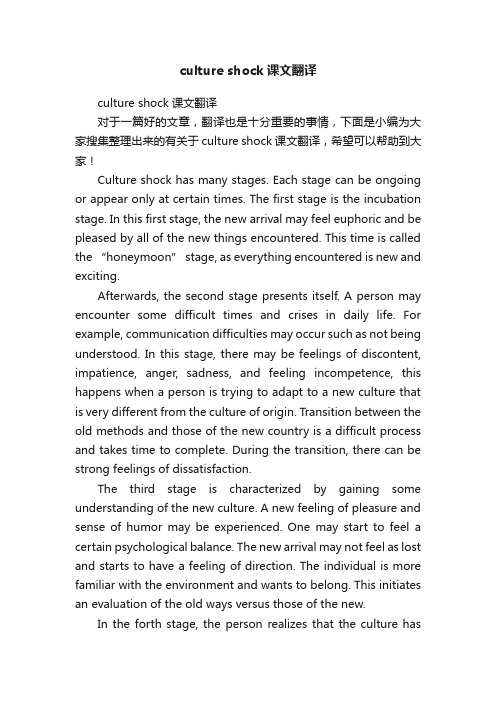
culture shock课文翻译culture shock课文翻译对于一篇好的文章,翻译也是十分重要的事情,下面是小编为大家搜集整理出来的有关于culture shock课文翻译,希望可以帮助到大家!Culture shock has many stages. Each stage can be ongoing or appear only at certain times. The first stage is the incubation stage. In this first stage, the new arrival may feel euphoric and be pleased by all of the new things encountered. This time is called the “honeymoon” stage, as everything encountered is new and exciting.Afterwards, the second stage presents itself. A person may encounter some difficult times and crises in daily life. For example, communication difficulties may occur such as not being understood. In this stage, there may be feelings of discontent, impatience, anger, sadness, and feeling incompetence, this happens when a person is trying to adapt to a new culture that is very different from the culture of origin. Transition between the old methods and those of the new country is a difficult process and takes time to complete. During the transition, there can be strong feelings of dissatisfaction.The third stage is characterized by gaining some understanding of the new culture. A new feeling of pleasure and sense of humor may be experienced. One may start to feel a certain psychological balance. The new arrival may not feel as lost and starts to have a feeling of direction. The individual is more familiar with the environment and wants to belong. This initiates an evaluation of the old ways versus those of the new.In the forth stage, the person realizes that the culture hasgood and bad things to offer. This stage can be one of double integration or triple integration depending on the number of cultures that the person has to process. This integration is accompanied by a more solid feeling of belonging. The person starts to define him/herself and establish goals for living.The fifth stage is the stage that is called the “re-entry shock..” this occurs when a return to the country of origin is made. One may fin that things are no longer the same. For example, some of the newly acquired customs are not in use in the old culture.These stages are present at different times and each person has their own way of reacting in the stages of culture shock. As a consequence, some stages will be longer and more difficult than others. Many factors contribute to the duration and effects of culture shock. For example, the individual’s state of mental health, type of personality, previous experiences, socio-economic conditions, familiarity with the language, family and/or social support systems,and level of education.翻译文化冲击有许多阶段。
自-我的旅美“文化震惊”
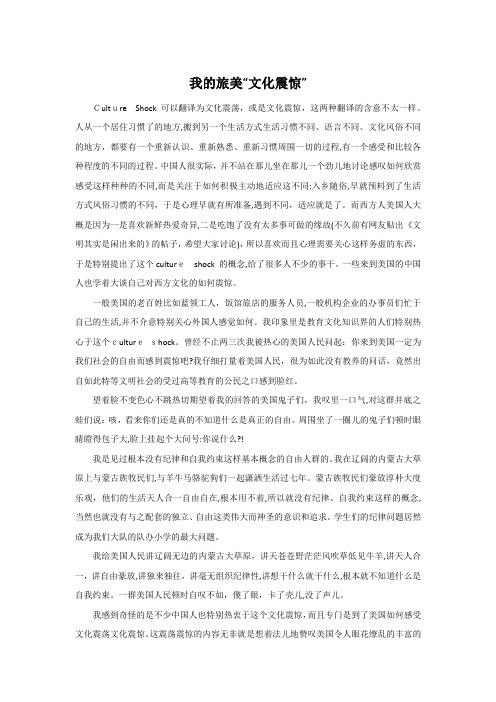
我的旅美“文化震惊”Culture Shock 可以翻译为文化震荡,或是文化震惊,这两种翻译的含意不太一样。
人从一个居住习惯了的地方,搬到另一个生活方式生活习惯不同、语言不同、文化风俗不同的地方,都要有一个重新认识、重新熟悉、重新习惯周围一切的过程,有一个感受和比较各种程度的不同的过程。
中国人很实际,并不站在那儿坐在那儿一个劲儿地讨论感叹如何欣赏感受这样种种的不同,而是关注于如何积极主动地适应这不同:入乡随俗,早就预料到了生活方式风俗习惯的不同,于是心理早就有所准备,遇到不同,适应就是了。
而西方人美国人大概是因为一是喜欢新鲜热爱奇异,二是吃饱了没有太多事可做的缘故(不久前有网友贴出《文明其实是闲出来的》的帖子,希望大家讨论),所以喜欢而且心理需要关心这样务虚的东西,于是特别提出了这个cultureshock 的概念,给了很多人不少的事干。
一些来到美国的中国人也学着大谈自己对西方文化的如何震惊。
一般美国的老百姓比如蓝领工人,饭馆旅店的服务人员,一般机构企业的办事员们忙于自己的生活,并不介意特别关心外国人感觉如何。
我印象里是教育文化知识界的人们特别热心于这个cultureshock。
曾经不止两三次我被热心的美国人民问起:你来到美国一定为我们社会的自由而感到震惊吧?我仔细打量着美国人民,很为如此没有教养的问话,竟然出自如此特等文明社会的受过高等教育的公民之口感到脸红。
望着脸不变色心不跳热切期望着我的回答的美国鬼子们,我叹里一口气,对这群井底之蛙们说:咳,看来你们还是真的不知道什么是真正的自由。
周围坐了一圈儿的鬼子们顿时眼睛瞪得包子大,脸上挂起个大问号:你说什么?!我是见过根本没有纪律和自我约束这样基本概念的自由人群的。
我在辽阔的内蒙古大草原上与蒙古族牧民们,与羊牛马骆驼狗们一起潇洒生活过七年。
蒙古族牧民们豪放淳朴大度乐观,他们的生活天人合一自由自在,根本用不着,所以就没有纪律、自我约束这样的概念,当然也就没有与之配套的独立、自由这类伟大而神圣的意识和追求。
- 1、下载文档前请自行甄别文档内容的完整性,平台不提供额外的编辑、内容补充、找答案等附加服务。
- 2、"仅部分预览"的文档,不可在线预览部分如存在完整性等问题,可反馈申请退款(可完整预览的文档不适用该条件!)。
- 3、如文档侵犯您的权益,请联系客服反馈,我们会尽快为您处理(人工客服工作时间:9:00-18:30)。
Those signs or cues include a thousand and one ways with which we are familiar in the situation of daily life: 译文:这些标志和提示包括我们熟悉的日常生活中办事的许许多多方式。 signs or cues标记、迹象或者线索 Be familiar with 对……熟悉;be similar to与……相似。 when to shake hands and what to say when we meet people, 遇到人时何时握手,又该说些什么;
a feeling of helplessness and a desire for dependence on long-term residents of one's own nationality; 一种无助感和一种总想依赖当地定居已久的同胞的欲望; fits of anger over minor frustrations; 因小小的挫折而时时发火; great concern over minor pains and eruptions of the skin;and finally, that terrible longing to be back home. 过分关注身体的轻微疼痛和皮疹;最后,急切地盼望回家。 5 Individuals differ greatly in the degree in which culture shock affects them. Differ from: …与…不同 Differ in: 在……不同 Although not common, there are individuals who can not live in foreign countries. 有些人无法在国外生活,尽管这并不常见。 英文解析:Some people find it so hard to adapt to a new environment that they cannot live anywhere except in their own country, but this is not common.
4 Some of the symptoms of culture shock are excessive washing of the hands; 还有一些文化震荡的迹象就是过分地洗手; excessive concern over drinking water, food dishes, and bedding; 过分地关注喝的水、吃的东西和床上用品; Concern over sth./sb.: 对…表示关心或忧虑 be concerned with/about sth.:对…关注 concern oneself with/about sth.: to be interested in对…感兴趣 out of concern: 出于关心 fear of physical contact with attendants;the absent-minded stare; 害怕和其他来这儿的人有身体上的碰触;心不在焉地凝视;
Take sth. seriously: 认真对待 Take sth. for granted: 认为……理所当然 Take sth./sb. for sth./sb.: to mistake sth./sb. for sth./sb.视……为……;把…误认为 … Take off: 起飞 Take sth. off: 脱掉 Take sth. into one's own hands: to be responsible for 负起…的责任 Take on: to appear 呈现 Take sth. on: 承担(工作或责任等) Take sb. on: to employ sb. 雇佣某人 Take place:发生 Take the place of : 代替 Take advantage of: to make use of 利用 Take over: 接管;兼并 Take part in: to attend 参加 Take notice of: 注意到
Ⅱ.Text Part 1: (Paras. 1-2) Cause and Symptoms Kalvero Oberg 1 Culture shock might be called an occupational disease of people who have been suddenly transplanted abroad. 译文:文化震荡可称为突然移居到国外的那些人的一种职业病。 (文章一开始,开门见山地阐明文化震荡的定义,直接切入主题。) Culture shock might be called是被动语态 Like most diseases, it has its own symptoms. 译文:像大多数疾病一样,这种病也有其自身的症状。
when and how to give tips, how to go shopping, when to accept and when to refuse invitations, when to take statements seriously and when not: 什么时候给小费,怎么给;怎样购物;什么时候该接受人家的邀请,什么时候该谢绝; 什么情况下应该认真对待别人说的话,什么情况下又应把别人的话看成是开玩笑。 Take…seriously认真对待
I. Outline of the Text Part 1: (Paras. 1-2) What is culture shock? It is what people suffer in a strange land. Part 2: (Paras. 3-5) Many symptoms of culture shock ☆ People tend to reject the new place. ☆ People begin to glorify their home country. ☆ Minor symptoms include suspicion, dependence, longing to be back home, etc. Part 3: (Paras. 6-10) There are four stages of adjustment. ☆ In the honeymoon stage, you feel everything interesting and positive. ☆ In the crisis stage, you have to face the difficulties. ☆ In the recovery stage, you gradually get used to everything in the new environment. In the adjustment stage, you feel at home and everything is all right.
Part 2: (Paras. 3-5) 3 Now when a person enters a strange culture, all or most of these familiar cues are removed. He or she is like a fish out of water. No matter how broad-minded or full of goodwill you may be, a series of props have been knocked from under you, followed by a feeling of frustration and anxiety. 无论你的思想如何开通,无论你的愿望有多好,支撑你的那些柱子一下子从你的脚下 被抽掉,你就会大有受挫之感与忧虑不安之感。 People react to the frustration in much the same way. 人们对这些挫折的反应方式差不多相同。 First they reject the environment which causes the discomfort. 他们的第一反应是拒绝这个导致不快的环境。 注意Reject; refuse; decline的区别: He rejected my friendly advice.(他当面拒绝了我的善意劝告。) She refused to come with us.(她断然拒绝同我们一起来。) He declined my invitation.(他委婉地拒绝了我的邀请。)
These cues, which may be words, gestures, facial expressions, customs, or norms, are acquired by all of us in the course of growing up and are as much a part of our culture as the language we speak or the beliefs we accept. 这些信号,可能是文字、姿势、面部表情、习俗或规范,在我们成长的过程中逐渐被 我们接受,它们和我们使用的语言或我们所接受的信仰一样是我们文化的一部分。 as …… as同级比较。 All of us depend for our peace of mind and our efficiency on hundreds of these cues, often without our conscious awareness. 我们每个人都是不自觉地依赖这些成百上千的信号来维持心境的平和及办事的效率。 Depend on sb./ sth.(for sth.):依靠,依赖 …… 而获得…… 这部分作者讲了:What is culture shock? It is what people suffer in a strange land.
